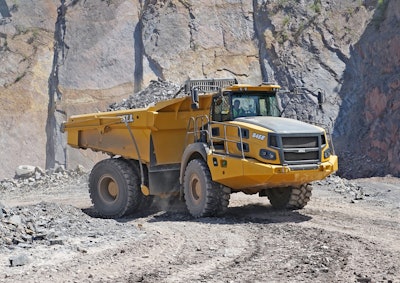Here’s the latest in ADTs from Bell, Caterpillar, Develon, Hyundai, John Deere, Liebherr, Rokbak and Volvo.
These hauling workhorses from major manufacturers come with loads of features to make life easier for operators and to increase productivity.
Here’s the latest in articulated dump trucks from Bell, Caterpillar, Develon, Hyundai, John Deere, Liebherr, Rokbak and Volvo.
Bell Adds 4×4 E-Series Models
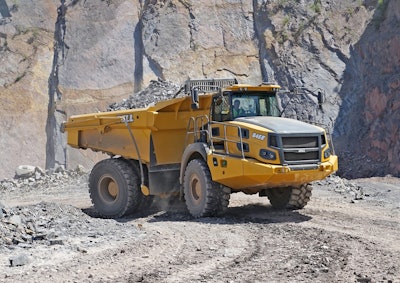 The Bell B45E has a Mercedes engine rated at 523 gross horsepower backed by an Allison seven-speed transmission. Unladen operating weight is 71,267 pounds. Nominal payload is 91,390 pounds. Bell’s E-series trucks deliver 6% to 7% lower fuel consumption compared to D-Series models. Raise time is 11 seconds, and lower time is 6 seconds. Standard tipping angle is 70 degrees, and a lower angle can be programmed in.Bell EquipmentBell offers 10 models of ADTs, from the 18-metric-ton B20E LGP to the 55-metric-ton B60E, as well as the Versa Truck that can be configured with different body types.
The Bell B45E has a Mercedes engine rated at 523 gross horsepower backed by an Allison seven-speed transmission. Unladen operating weight is 71,267 pounds. Nominal payload is 91,390 pounds. Bell’s E-series trucks deliver 6% to 7% lower fuel consumption compared to D-Series models. Raise time is 11 seconds, and lower time is 6 seconds. Standard tipping angle is 70 degrees, and a lower angle can be programmed in.Bell EquipmentBell offers 10 models of ADTs, from the 18-metric-ton B20E LGP to the 55-metric-ton B60E, as well as the Versa Truck that can be configured with different body types.
Brad Castle, Bell Equipment product manager, focused on the company’s three 4×4 models: B30E 4×4, B45E 4×4 and B60E 4×4.
“These E-series machines offer the same production values as their 6×6 counterparts, but at a lower overall cost,” says Castle.
He uses the B45E 4×4, with its new full-suspension chassis, as an example. The E-series truck has the same twin oil/nitrogen shock absorbers on the drive axle as on the B60E. As part of the Comfort Ride suspension system, the shock absorbers enhance driving comfort and productivity. The new suspension design will accommodate 21.00R35 rear twin tires with snow chains. The truck has an anti-slip differential plus sensor-based traction control.
The B45E 4×4 has a specifically adapted rock bin to match wheel loaders; whereas, it originally had a bin modeled after the B60E, which is loaded by excavators. The redesigned bin is longer and has a straight front wall for faster loading. The maximum tipping height and ground clearance of the chute are nearly the same as the old bin so access to infrastructure such as crusher housings is unaffected by the new bin design.
While 6×6 models still offer better performance in extreme underfoot conditions, the three 4×4 models provide excellent performance for many customers with reduced tire scuffing and lower parasitic loads.
Caterpillar’s Operator Assist Tech
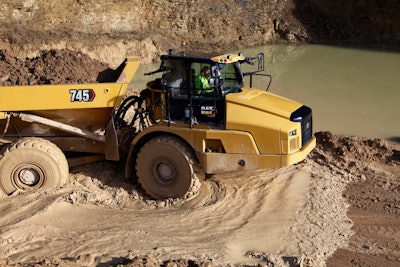 The Cat 745 is powered by a Cat C18 engine rated at 511 gross horsepower, generating up to 8% lower carbon-dioxide emissions than the 745C. The transmission has nine forward and two reverse gears providing travel speeds of up to 34 mph forward and 9.1 mph in reverse. Features include Cat Product Link for operational data, Cat Production measurement onboard weighing and Cat Detect with Stability Assist for enhanced safety.CaterpillarScott Thomas, marketing professional, articulated trucks, Caterpillar, noted the many technologies on the company’s lineup of ADTs to help operators:
The Cat 745 is powered by a Cat C18 engine rated at 511 gross horsepower, generating up to 8% lower carbon-dioxide emissions than the 745C. The transmission has nine forward and two reverse gears providing travel speeds of up to 34 mph forward and 9.1 mph in reverse. Features include Cat Product Link for operational data, Cat Production measurement onboard weighing and Cat Detect with Stability Assist for enhanced safety.CaterpillarScott Thomas, marketing professional, articulated trucks, Caterpillar, noted the many technologies on the company’s lineup of ADTs to help operators:
- At the flick of a switch, Assisted Hoisting Control applies the service brakes, shifts the transmission to neutral and raises the dump body at the correct engine speed. Another flick of a switch puts the body in float mode for a controlled lowering.
- Advanced Automatic Traction Control is fully automatic and modulated by four-wheel slip sensors operating at 100 Hz. Traction is maintained by controlling oil flow in wet clutch packs. The system is integrated with steering so there is no plowing in turns, as is common with locking differentials.
- Automatic Retarder Control engages engine compression as needed and can activate service brakes when additional braking is required. (The 725 has a hydraulic transmission retarder instead of Automatic Retarder Control.)
- Hill Assist holds the service brake on when the truck is on an incline, and the operator’s foot moves from the brake to the accelerator.
- Stability Assist monitors truck attitude and maintains stability even on side slopes with the body raised.
He also noted that Cat has two ejector models, the 730 EJ and 740 EJ. The elimination of material carry-back is a big advantage, but the biggest advantage is the ability to spread material in forward and reverse, even on a side slope, while still being able to dump to a pile when desired.
“It takes three to five pushes with a D6 to spread the pile from a 745,” says Thomas. “The ability to spread the payload while dumping minimizes or eliminates this, saving time and operational expense.”
Ejector models have a higher initial investment, but the payback is quick for the right customers, he says.
Caterpillar continually seeks ways to refine the basics of its 12-model ADT lineup with improvements to such things as diesel exhaust fluid management, system sensors and wiring harnesses, Thomas says. “An ADT is not a support machine, and uptime is crucial. So we’re always looking for ways to further enhance reliability.”
Develon’s Unique Features
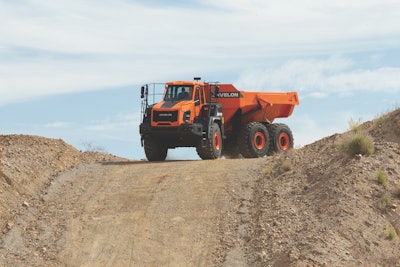 Develon’s DA45-5 truck shown has 482.8 net horsepower, a 40.5-metric-ton payload and an operating weight of 67,240 pounds. The DA30-5 has a 28-metric-ton payload and an operating weight of 51,147 pounds. Each has hydro-gas self-levelling front suspension for a smoother ride and enhanced operator comfort. The cab features fully automatic climate control and a heated, air-suspension seat. Overall width is under 12 feet for easier transportability.DevelonOne unique feature of Develon ADTs is the placement of the turning ring forward of the articulation point, allowing the dump bed to rotate independent of the cab.
Develon’s DA45-5 truck shown has 482.8 net horsepower, a 40.5-metric-ton payload and an operating weight of 67,240 pounds. The DA30-5 has a 28-metric-ton payload and an operating weight of 51,147 pounds. Each has hydro-gas self-levelling front suspension for a smoother ride and enhanced operator comfort. The cab features fully automatic climate control and a heated, air-suspension seat. Overall width is under 12 feet for easier transportability.DevelonOne unique feature of Develon ADTs is the placement of the turning ring forward of the articulation point, allowing the dump bed to rotate independent of the cab.
In an extreme situation, the dump body could roll over entirely onto its side, and the cab would remain upright. In everyday operation, the design provides better stability and comfort, which is further enhanced by the hydro-gas front suspension that keeps the cab level.
The turning ring placement and the 7-degree sloping rear frame evenly distribute weight between the cab wheels in front and the tandem bogie wheels in back. Traditional designs can have this 50/50 split in straight travel, but the distribution shifts in turns. In a 45-degree turn, the outside wheel of a traditional ADT bears 100% of the weight transfer and the inside wheel none; the Develon design maintains a 50/50 split on the inside and outside wheels.
The tandem rear bogie design ensures all six wheels maintain ground contact over extreme terrain. “This is a huge advantage,” says Bill Zak, senior product manager, wheel loaders and ADTs, Develon. “Traditional designs with tandem rear axles have less compliance and often force fewer than all four rear wheels to bear the load, suspending the other wheel or wheels ineffectively in mid-air.”
Develon has two models, the 28-metric-ton DA30-5 and the 40.5-metric-ton DA45-5. Both include central lube as standard.
Also standard is a bed heater. Diffusers regulate the flow of heat, and a breakaway joint safely separates the exhaust from the heater ducts if necessary.
Hyundai’s HA30 and HA45
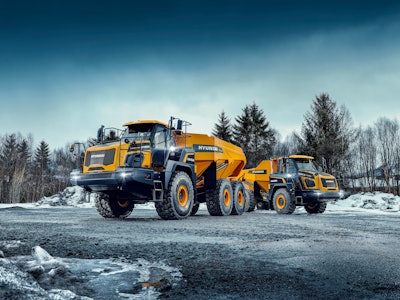 The Hyundai HA30 has a Scania DC9 engine rated at 375 horsepower, an operating weight of 51,147 pounds, a rated payload of 61,730 pound. and a heaped capacity of 19.5 cubic yards with tailgate. The HA45 has a Scania DC0 rated at 500 horsepower, an operating weight of 66,359 pounds, a rated payload of 90,390 pounds and a heaped capacity of 28.4 cubic yards with tailgate. Power figures are ISO 3046.HyundaiHyundai offers two models of ADTs, the HA30 at 28 metric tons and the HA45 at 41 metric tons.
The Hyundai HA30 has a Scania DC9 engine rated at 375 horsepower, an operating weight of 51,147 pounds, a rated payload of 61,730 pound. and a heaped capacity of 19.5 cubic yards with tailgate. The HA45 has a Scania DC0 rated at 500 horsepower, an operating weight of 66,359 pounds, a rated payload of 90,390 pounds and a heaped capacity of 28.4 cubic yards with tailgate. Power figures are ISO 3046.HyundaiHyundai offers two models of ADTs, the HA30 at 28 metric tons and the HA45 at 41 metric tons.
They run on Scania engines, rated at 362 net horsepower for the HA30 and 483 net horsepower for the HA45, and eight-speed ZF transmissions with engine retarder.
The oscillating rear axles deliver smooth travel over any terrain, Hyundai says, and it claims best-in-class ground clearance.
Standard features include onboard weighing with load tracking, heated dump bodies, air-ride seating and Bluetooth radios.
John Deere Rolls Out Next-Gen P-Tier Trucks
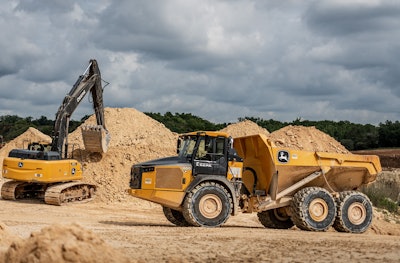 The John Deere 460 P-Tier has a Deere PowerTech 6135 engine with 481 net horsepower and a ZF transmission with eight forward and four reverse gears. The net operating weight of 69,886 pounds is lower than that of the E Series model which, coupled with three drive modes, yields up to 7% better fuel efficiency. The entirely new dump body has better material retention, a lower loading height and a lower center of gravity.John DeereJohn Deere is updating its four models of P-Tier ADTs: the 460, 410, 310 and 260.
The John Deere 460 P-Tier has a Deere PowerTech 6135 engine with 481 net horsepower and a ZF transmission with eight forward and four reverse gears. The net operating weight of 69,886 pounds is lower than that of the E Series model which, coupled with three drive modes, yields up to 7% better fuel efficiency. The entirely new dump body has better material retention, a lower loading height and a lower center of gravity.John DeereJohn Deere is updating its four models of P-Tier ADTs: the 460, 410, 310 and 260.
New features to all four models will include relocated rear lighting for better illumination while dumping and Deere’s Advanced Vision System.
All P-Tier trucks had rearview cameras, which was the foundation for AVS with its four cameras. The AVS system includes cameras mounted on both exterior mirrors with monitors mounted inside the cab adjacent the operator’s line of sight to the mirrors. The fourth camera is front-mounted and located just above the grille. A center monitor can display the front view, the rear view only when in reverse, or the rear view always on.
The 410 and 460 now get the JD 14 engine already in use with other equipment in place of the previous models’ 13.5-liter engine. “The new engine’s architecture yields better support, has automatic valve lash adjusters, and the new high-pressure, common rail system boosts fuel efficiency,” says Matt Costello, product marketing manager, Deere.
Aftertreatment is designed to last for the life of the engine and relies mostly on passive regeneration. It has gone from a dual to a single canister. A new intake system and aftertreatment design improve bin heating.
All trucks have dump body heating ducts; the complete bin heating system is an option.
The cooling package has been optimized for the new engine as has the entire front of the truck. That new front will immediately identify the updated P-Tier ADT models. Service access is improved to the oil fill and battery box.
The 460 P-Tier can be ordered with a scraper-ready kit or with a full scraper package that includes the Deere 3812 scraper. The Scraper Pro packages include software and a camera with dedicated 10-inch monitor and automate a number of scraper functions.
Liebherr’s Full-Featured Artic
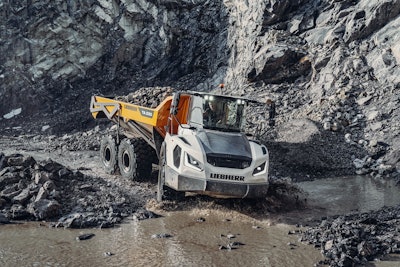 The TA230 Litronic from Liebherr has 360 horsepower and an operating weight of 54,200 pounds. The payload is 61,800 pounds, and maximum capacity is 23.67 cubic yards. An electrohydraulic system opens the hood effortlessly to access to all major engine components. This 8th-generation model includes full-time 6×6 drive, LED headlights and a new exterior design.LiebherrLiebherr’s one model of ADT, the 28-metric-ton TA 230 has a 360-horsepower engine (ISO 9249) mated to a ZF transmission with eight forward and four reverse gears. Maximum travel speeds are 35.4 mph forward and 9.9 mph reverse.
The TA230 Litronic from Liebherr has 360 horsepower and an operating weight of 54,200 pounds. The payload is 61,800 pounds, and maximum capacity is 23.67 cubic yards. An electrohydraulic system opens the hood effortlessly to access to all major engine components. This 8th-generation model includes full-time 6×6 drive, LED headlights and a new exterior design.LiebherrLiebherr’s one model of ADT, the 28-metric-ton TA 230 has a 360-horsepower engine (ISO 9249) mated to a ZF transmission with eight forward and four reverse gears. Maximum travel speeds are 35.4 mph forward and 9.9 mph reverse.
Other standard features include a foot pedal actuated 6×6 differential lock, retarder offering six levels, speed limiter that can be toggled on and off and longitudinal locks that can be set to Automatic or Permanent. Input controls are via the touchscreen and keypad entries and toggle switches. Steering is by rotary knob. LED lighting provides virtually 360 degrees of illumination.
“Liebherr focused on three key areas during product development and refinement,” says Isaac Tucker, ADT and hydraulic excavator product manager, Liebherr USA. “Those are safety, comfort and performance. Our robust set of standard features addresses all three areas.”
Rokbak Trucks
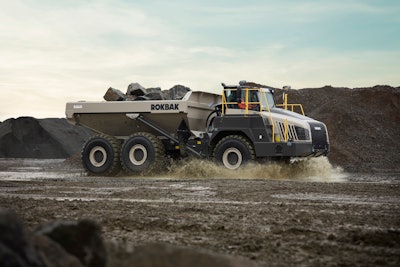 The RA40 is the larger of Rokbak’s two ADTs. It has 444 horsepower, a maximum payload of 38 metric tons and a heaped capacity of 30.3 cubic yards. The Allison six-speed planetary gear transmission provides forward speeds of up to 40 mph and reverse speeds of up to 4.8 mph and has an integral retarder. Raise time loaded is 12.5 seconds.RokbakRokbak launched as a brand in September 2021, but the trucks are made in a factory in Motherwell, Scotland, that opened in 1950. (For more information on the history of Rokbak, see our article on Volvo CE’s acquisition of Terex in 2014 and the rebranding to Rokbak in 2021.)
The RA40 is the larger of Rokbak’s two ADTs. It has 444 horsepower, a maximum payload of 38 metric tons and a heaped capacity of 30.3 cubic yards. The Allison six-speed planetary gear transmission provides forward speeds of up to 40 mph and reverse speeds of up to 4.8 mph and has an integral retarder. Raise time loaded is 12.5 seconds.RokbakRokbak launched as a brand in September 2021, but the trucks are made in a factory in Motherwell, Scotland, that opened in 1950. (For more information on the history of Rokbak, see our article on Volvo CE’s acquisition of Terex in 2014 and the rebranding to Rokbak in 2021.)
Two models are available, the 30.9-metric-ton, 370-horsepower RA30 and the 41.9-metric-ton, 444-horsepower RA40.
Each has a long list of features, including Haul Track telematics.
“Haul Track is designed to be simple and user-friendly,” says Robert Franklin, director of sales for the Americas, Rokbak, “providing fleet managers with actionable insights they can use to improve performance.”
Recent updates include Fleet Manager and Fleet Tracker, which allow users to tailor dashboards to their needs and preferences. The system provides a wide range of reports and alerts via email and can be integrated with Rokbak’s On-Board Weigh load system, which offers live payload data through a separate interface. To maximize telematics use with mixed fleets, Haul Track supports the AEMP 2.0 API standard for sharing data from multiple brands in one location.
Volvo CE to Release New Line
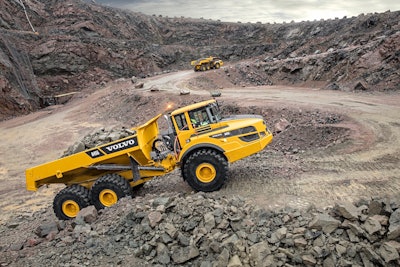 The Volvo A45G is powered by a Volvo D16J engine rated at 469 gross horsepower mated to a powershift transmission. Heaped capacity is 32.8 cubic yards. Features that enhance the operator experience include cruise control, downhill speed control and hill assist. Volvo High-Performance filters and engine oil can reduce filter and oil use by 50%.Volvo CE“A brand-new generation featuring major updates and an expanded lineup will be announced in early 2025,” says Tyler Smith, product manager, articulated haulers, Volvo Construction Equipment. (Be sure you’re subscribed to EquipmentWorld.com to get our coverage of these new models as they emerge.)
The Volvo A45G is powered by a Volvo D16J engine rated at 469 gross horsepower mated to a powershift transmission. Heaped capacity is 32.8 cubic yards. Features that enhance the operator experience include cruise control, downhill speed control and hill assist. Volvo High-Performance filters and engine oil can reduce filter and oil use by 50%.Volvo CE“A brand-new generation featuring major updates and an expanded lineup will be announced in early 2025,” says Tyler Smith, product manager, articulated haulers, Volvo Construction Equipment. (Be sure you’re subscribed to EquipmentWorld.com to get our coverage of these new models as they emerge.)
Volvo CE currently has seven models of ADTs from 27 to 60 metric tons. The largest is the A60H, which is also the only H Series model. The others remain in the G Series.
Features include Hill Assist for safety and easier operation on steep slopes and Haul Assist for on-board weighing and load tracking. Large cabs provide central seating, low noise, climate control and excellent visibility.
One technology that will surely be carried over into the new line is Connected Map, an app that provides real-time visual information on the trucks and personnel on a site.
These hauling workhorses from major manufacturers come with loads of features to make life easier for operators and to increase productivity.
Here’s the latest in articulated dump trucks from Bell, Caterpillar, Develon, Hyundai, John Deere, Liebherr, Rokbak and Volvo.
Bell Adds 4×4 E-Series Models
 The Bell B45E has a Mercedes engine rated at 523 gross horsepower backed by an Allison seven-speed transmission. Unladen operating weight is 71,267 pounds. Nominal payload is 91,390 pounds. Bell’s E-series trucks deliver 6% to 7% lower fuel consumption compared to D-Series models. Raise time is 11 seconds, and lower time is 6 seconds. Standard tipping angle is 70 degrees, and a lower angle can be programmed in.Bell EquipmentBell offers 10 models of ADTs, from the 18-metric-ton B20E LGP to the 55-metric-ton B60E, as well as the Versa Truck that can be configured with different body types.
The Bell B45E has a Mercedes engine rated at 523 gross horsepower backed by an Allison seven-speed transmission. Unladen operating weight is 71,267 pounds. Nominal payload is 91,390 pounds. Bell’s E-series trucks deliver 6% to 7% lower fuel consumption compared to D-Series models. Raise time is 11 seconds, and lower time is 6 seconds. Standard tipping angle is 70 degrees, and a lower angle can be programmed in.Bell EquipmentBell offers 10 models of ADTs, from the 18-metric-ton B20E LGP to the 55-metric-ton B60E, as well as the Versa Truck that can be configured with different body types.
Brad Castle, Bell Equipment product manager, focused on the company’s three 4×4 models: B30E 4×4, B45E 4×4 and B60E 4×4.
“These E-series machines offer the same production values as their 6×6 counterparts, but at a lower overall cost,” says Castle.
He uses the B45E 4×4, with its new full-suspension chassis, as an example. The E-series truck has the same twin oil/nitrogen shock absorbers on the drive axle as on the B60E. As part of the Comfort Ride suspension system, the shock absorbers enhance driving comfort and productivity. The new suspension design will accommodate 21.00R35 rear twin tires with snow chains. The truck has an anti-slip differential plus sensor-based traction control.
The B45E 4×4 has a specifically adapted rock bin to match wheel loaders; whereas, it originally had a bin modeled after the B60E, which is loaded by excavators. The redesigned bin is longer and has a straight front wall for faster loading. The maximum tipping height and ground clearance of the chute are nearly the same as the old bin so access to infrastructure such as crusher housings is unaffected by the new bin design.
While 6×6 models still offer better performance in extreme underfoot conditions, the three 4×4 models provide excellent performance for many customers with reduced tire scuffing and lower parasitic loads.
Caterpillar’s Operator Assist Tech
 The Cat 745 is powered by a Cat C18 engine rated at 511 gross horsepower, generating up to 8% lower carbon-dioxide emissions than the 745C. The transmission has nine forward and two reverse gears providing travel speeds of up to 34 mph forward and 9.1 mph in reverse. Features include Cat Product Link for operational data, Cat Production measurement onboard weighing and Cat Detect with Stability Assist for enhanced safety.CaterpillarScott Thomas, marketing professional, articulated trucks, Caterpillar, noted the many technologies on the company’s lineup of ADTs to help operators:
The Cat 745 is powered by a Cat C18 engine rated at 511 gross horsepower, generating up to 8% lower carbon-dioxide emissions than the 745C. The transmission has nine forward and two reverse gears providing travel speeds of up to 34 mph forward and 9.1 mph in reverse. Features include Cat Product Link for operational data, Cat Production measurement onboard weighing and Cat Detect with Stability Assist for enhanced safety.CaterpillarScott Thomas, marketing professional, articulated trucks, Caterpillar, noted the many technologies on the company’s lineup of ADTs to help operators:
- At the flick of a switch, Assisted Hoisting Control applies the service brakes, shifts the transmission to neutral and raises the dump body at the correct engine speed. Another flick of a switch puts the body in float mode for a controlled lowering.
- Advanced Automatic Traction Control is fully automatic and modulated by four-wheel slip sensors operating at 100 Hz. Traction is maintained by controlling oil flow in wet clutch packs. The system is integrated with steering so there is no plowing in turns, as is common with locking differentials.
- Automatic Retarder Control engages engine compression as needed and can activate service brakes when additional braking is required. (The 725 has a hydraulic transmission retarder instead of Automatic Retarder Control.)
- Hill Assist holds the service brake on when the truck is on an incline, and the operator’s foot moves from the brake to the accelerator.
- Stability Assist monitors truck attitude and maintains stability even on side slopes with the body raised.
He also noted that Cat has two ejector models, the 730 EJ and 740 EJ. The elimination of material carry-back is a big advantage, but the biggest advantage is the ability to spread material in forward and reverse, even on a side slope, while still being able to dump to a pile when desired.
“It takes three to five pushes with a D6 to spread the pile from a 745,” says Thomas. “The ability to spread the payload while dumping minimizes or eliminates this, saving time and operational expense.”
Ejector models have a higher initial investment, but the payback is quick for the right customers, he says.
Caterpillar continually seeks ways to refine the basics of its 12-model ADT lineup with improvements to such things as diesel exhaust fluid management, system sensors and wiring harnesses, Thomas says. “An ADT is not a support machine, and uptime is crucial. So we’re always looking for ways to further enhance reliability.”
Develon’s Unique Features
 Develon’s DA45-5 truck shown has 482.8 net horsepower, a 40.5-metric-ton payload and an operating weight of 67,240 pounds. The DA30-5 has a 28-metric-ton payload and an operating weight of 51,147 pounds. Each has hydro-gas self-levelling front suspension for a smoother ride and enhanced operator comfort. The cab features fully automatic climate control and a heated, air-suspension seat. Overall width is under 12 feet for easier transportability.DevelonOne unique feature of Develon ADTs is the placement of the turning ring forward of the articulation point, allowing the dump bed to rotate independent of the cab.
Develon’s DA45-5 truck shown has 482.8 net horsepower, a 40.5-metric-ton payload and an operating weight of 67,240 pounds. The DA30-5 has a 28-metric-ton payload and an operating weight of 51,147 pounds. Each has hydro-gas self-levelling front suspension for a smoother ride and enhanced operator comfort. The cab features fully automatic climate control and a heated, air-suspension seat. Overall width is under 12 feet for easier transportability.DevelonOne unique feature of Develon ADTs is the placement of the turning ring forward of the articulation point, allowing the dump bed to rotate independent of the cab.
In an extreme situation, the dump body could roll over entirely onto its side, and the cab would remain upright. In everyday operation, the design provides better stability and comfort, which is further enhanced by the hydro-gas front suspension that keeps the cab level.
The turning ring placement and the 7-degree sloping rear frame evenly distribute weight between the cab wheels in front and the tandem bogie wheels in back. Traditional designs can have this 50/50 split in straight travel, but the distribution shifts in turns. In a 45-degree turn, the outside wheel of a traditional ADT bears 100% of the weight transfer and the inside wheel none; the Develon design maintains a 50/50 split on the inside and outside wheels.
The tandem rear bogie design ensures all six wheels maintain ground contact over extreme terrain. “This is a huge advantage,” says Bill Zak, senior product manager, wheel loaders and ADTs, Develon. “Traditional designs with tandem rear axles have less compliance and often force fewer than all four rear wheels to bear the load, suspending the other wheel or wheels ineffectively in mid-air.”
Develon has two models, the 28-metric-ton DA30-5 and the 40.5-metric-ton DA45-5. Both include central lube as standard.
Also standard is a bed heater. Diffusers regulate the flow of heat, and a breakaway joint safely separates the exhaust from the heater ducts if necessary.
Hyundai’s HA30 and HA45
 The Hyundai HA30 has a Scania DC9 engine rated at 375 horsepower, an operating weight of 51,147 pounds, a rated payload of 61,730 pound. and a heaped capacity of 19.5 cubic yards with tailgate. The HA45 has a Scania DC0 rated at 500 horsepower, an operating weight of 66,359 pounds, a rated payload of 90,390 pounds and a heaped capacity of 28.4 cubic yards with tailgate. Power figures are ISO 3046.HyundaiHyundai offers two models of ADTs, the HA30 at 28 metric tons and the HA45 at 41 metric tons.
The Hyundai HA30 has a Scania DC9 engine rated at 375 horsepower, an operating weight of 51,147 pounds, a rated payload of 61,730 pound. and a heaped capacity of 19.5 cubic yards with tailgate. The HA45 has a Scania DC0 rated at 500 horsepower, an operating weight of 66,359 pounds, a rated payload of 90,390 pounds and a heaped capacity of 28.4 cubic yards with tailgate. Power figures are ISO 3046.HyundaiHyundai offers two models of ADTs, the HA30 at 28 metric tons and the HA45 at 41 metric tons.
They run on Scania engines, rated at 362 net horsepower for the HA30 and 483 net horsepower for the HA45, and eight-speed ZF transmissions with engine retarder.
The oscillating rear axles deliver smooth travel over any terrain, Hyundai says, and it claims best-in-class ground clearance.
Standard features include onboard weighing with load tracking, heated dump bodies, air-ride seating and Bluetooth radios.
John Deere Rolls Out Next-Gen P-Tier Trucks
 The John Deere 460 P-Tier has a Deere PowerTech 6135 engine with 481 net horsepower and a ZF transmission with eight forward and four reverse gears. The net operating weight of 69,886 pounds is lower than that of the E Series model which, coupled with three drive modes, yields up to 7% better fuel efficiency. The entirely new dump body has better material retention, a lower loading height and a lower center of gravity.John DeereJohn Deere is updating its four models of P-Tier ADTs: the 460, 410, 310 and 260.
The John Deere 460 P-Tier has a Deere PowerTech 6135 engine with 481 net horsepower and a ZF transmission with eight forward and four reverse gears. The net operating weight of 69,886 pounds is lower than that of the E Series model which, coupled with three drive modes, yields up to 7% better fuel efficiency. The entirely new dump body has better material retention, a lower loading height and a lower center of gravity.John DeereJohn Deere is updating its four models of P-Tier ADTs: the 460, 410, 310 and 260.
New features to all four models will include relocated rear lighting for better illumination while dumping and Deere’s Advanced Vision System.
All P-Tier trucks had rearview cameras, which was the foundation for AVS with its four cameras. The AVS system includes cameras mounted on both exterior mirrors with monitors mounted inside the cab adjacent the operator’s line of sight to the mirrors. The fourth camera is front-mounted and located just above the grille. A center monitor can display the front view, the rear view only when in reverse, or the rear view always on.
The 410 and 460 now get the JD 14 engine already in use with other equipment in place of the previous models’ 13.5-liter engine. “The new engine’s architecture yields better support, has automatic valve lash adjusters, and the new high-pressure, common rail system boosts fuel efficiency,” says Matt Costello, product marketing manager, Deere.
Aftertreatment is designed to last for the life of the engine and relies mostly on passive regeneration. It has gone from a dual to a single canister. A new intake system and aftertreatment design improve bin heating.
All trucks have dump body heating ducts; the complete bin heating system is an option.
The cooling package has been optimized for the new engine as has the entire front of the truck. That new front will immediately identify the updated P-Tier ADT models. Service access is improved to the oil fill and battery box.
The 460 P-Tier can be ordered with a scraper-ready kit or with a full scraper package that includes the Deere 3812 scraper. The Scraper Pro packages include software and a camera with dedicated 10-inch monitor and automate a number of scraper functions.
Liebherr’s Full-Featured Artic
 The TA230 Litronic from Liebherr has 360 horsepower and an operating weight of 54,200 pounds. The payload is 61,800 pounds, and maximum capacity is 23.67 cubic yards. An electrohydraulic system opens the hood effortlessly to access to all major engine components. This 8th-generation model includes full-time 6×6 drive, LED headlights and a new exterior design.LiebherrLiebherr’s one model of ADT, the 28-metric-ton TA 230 has a 360-horsepower engine (ISO 9249) mated to a ZF transmission with eight forward and four reverse gears. Maximum travel speeds are 35.4 mph forward and 9.9 mph reverse.
The TA230 Litronic from Liebherr has 360 horsepower and an operating weight of 54,200 pounds. The payload is 61,800 pounds, and maximum capacity is 23.67 cubic yards. An electrohydraulic system opens the hood effortlessly to access to all major engine components. This 8th-generation model includes full-time 6×6 drive, LED headlights and a new exterior design.LiebherrLiebherr’s one model of ADT, the 28-metric-ton TA 230 has a 360-horsepower engine (ISO 9249) mated to a ZF transmission with eight forward and four reverse gears. Maximum travel speeds are 35.4 mph forward and 9.9 mph reverse.
Other standard features include a foot pedal actuated 6×6 differential lock, retarder offering six levels, speed limiter that can be toggled on and off and longitudinal locks that can be set to Automatic or Permanent. Input controls are via the touchscreen and keypad entries and toggle switches. Steering is by rotary knob. LED lighting provides virtually 360 degrees of illumination.
“Liebherr focused on three key areas during product development and refinement,” says Isaac Tucker, ADT and hydraulic excavator product manager, Liebherr USA. “Those are safety, comfort and performance. Our robust set of standard features addresses all three areas.”
Rokbak Trucks
 The RA40 is the larger of Rokbak’s two ADTs. It has 444 horsepower, a maximum payload of 38 metric tons and a heaped capacity of 30.3 cubic yards. The Allison six-speed planetary gear transmission provides forward speeds of up to 40 mph and reverse speeds of up to 4.8 mph and has an integral retarder. Raise time loaded is 12.5 seconds.RokbakRokbak launched as a brand in September 2021, but the trucks are made in a factory in Motherwell, Scotland, that opened in 1950. (For more information on the history of Rokbak, see our article on Volvo CE’s acquisition of Terex in 2014 and the rebranding to Rokbak in 2021.)
The RA40 is the larger of Rokbak’s two ADTs. It has 444 horsepower, a maximum payload of 38 metric tons and a heaped capacity of 30.3 cubic yards. The Allison six-speed planetary gear transmission provides forward speeds of up to 40 mph and reverse speeds of up to 4.8 mph and has an integral retarder. Raise time loaded is 12.5 seconds.RokbakRokbak launched as a brand in September 2021, but the trucks are made in a factory in Motherwell, Scotland, that opened in 1950. (For more information on the history of Rokbak, see our article on Volvo CE’s acquisition of Terex in 2014 and the rebranding to Rokbak in 2021.)
Two models are available, the 30.9-metric-ton, 370-horsepower RA30 and the 41.9-metric-ton, 444-horsepower RA40.
Each has a long list of features, including Haul Track telematics.
“Haul Track is designed to be simple and user-friendly,” says Robert Franklin, director of sales for the Americas, Rokbak, “providing fleet managers with actionable insights they can use to improve performance.”
Recent updates include Fleet Manager and Fleet Tracker, which allow users to tailor dashboards to their needs and preferences. The system provides a wide range of reports and alerts via email and can be integrated with Rokbak’s On-Board Weigh load system, which offers live payload data through a separate interface. To maximize telematics use with mixed fleets, Haul Track supports the AEMP 2.0 API standard for sharing data from multiple brands in one location.
Volvo CE to Release New Line
 The Volvo A45G is powered by a Volvo D16J engine rated at 469 gross horsepower mated to a powershift transmission. Heaped capacity is 32.8 cubic yards. Features that enhance the operator experience include cruise control, downhill speed control and hill assist. Volvo High-Performance filters and engine oil can reduce filter and oil use by 50%.Volvo CE“A brand-new generation featuring major updates and an expanded lineup will be announced in early 2025,” says Tyler Smith, product manager, articulated haulers, Volvo Construction Equipment. (Be sure you’re subscribed to EquipmentWorld.com to get our coverage of these new models as they emerge.)
The Volvo A45G is powered by a Volvo D16J engine rated at 469 gross horsepower mated to a powershift transmission. Heaped capacity is 32.8 cubic yards. Features that enhance the operator experience include cruise control, downhill speed control and hill assist. Volvo High-Performance filters and engine oil can reduce filter and oil use by 50%.Volvo CE“A brand-new generation featuring major updates and an expanded lineup will be announced in early 2025,” says Tyler Smith, product manager, articulated haulers, Volvo Construction Equipment. (Be sure you’re subscribed to EquipmentWorld.com to get our coverage of these new models as they emerge.)
Volvo CE currently has seven models of ADTs from 27 to 60 metric tons. The largest is the A60H, which is also the only H Series model. The others remain in the G Series.
Features include Hill Assist for safety and easier operation on steep slopes and Haul Assist for on-board weighing and load tracking. Large cabs provide central seating, low noise, climate control and excellent visibility.
One technology that will surely be carried over into the new line is Connected Map, an app that provides real-time visual information on the trucks and personnel on a site.


